This
series of yarns is all about us missionary's kids traveling from home to boarding
school, and back home again, on the East African Railways and Harbors trains and
lake steamers.
Because
I lived in the colonial era of the British in East Africa all this traveling was
done under protocols which no longer exist anywhere on earth. The colonial European
powers have all handed their empires over to the people they once ruled, and life
has become very different. Many of my experiences, if duplicated today, would
be considered absolutely lawless and improper.
So,
let us go back in time and meet some of these missionary's kids and see them living
a life much like Huckleberry Finn or Penrod, but in Africa.
In
Part Four we will contemplate the effect which boarding school had on missionaries'
kids, and we will look at solutions to the ongoing myth that God needs missionary
kids out of the house so he can get more souls saved.
This
is a brief primer on the colonial era to explain how, why, and with what results
the European powers gobbled up Africa long ago. You may have been sent here from
other yarns of mine to learn the context of some other story. I am certainly not
the final authority on colonial Africa, but then, I did see the end of that era
and the beginning of national independence of African nations. I think I have
some knowledge that qualifies me to discuss this story.
To
understand the Kenya railways and the lake steamers on Lake Victoria, and to learn
the context of this narrative of mine, you need to learn how the railways and
lake steamers came into existence. The history of colonial railways under British
rule is very unique and full of strange and picturesque twists. So, we look first
at what caused Great Britain to build a railway into central Africa with little
or no real reason other than, "The Germans are coming."
At
my age today I have developed a well rounded but somewhat bigoted view of this
discussion. My attitude is probably because of all the stupid revisionist history
of Africa written by Liberal activist nut cases at American and British universities.
Also, many modern African historians have tragically destroyed the true facts
about their own history in a misguided effort to make of their nation more than
it is. It is a well known fact that, in the first years after national post-independence
events take place, local historians like to hide the occasional clunky disgusting
behavior of their founding fathers. But, I shall try to slap the idiots, but with
some restraint in the classic British colonial congenial way. After all, if you
are stupid, my friend, perhaps you came by it sincerely, and I shall try to keep
that in mind. Cough cough, spot of tea what, one lump or two?
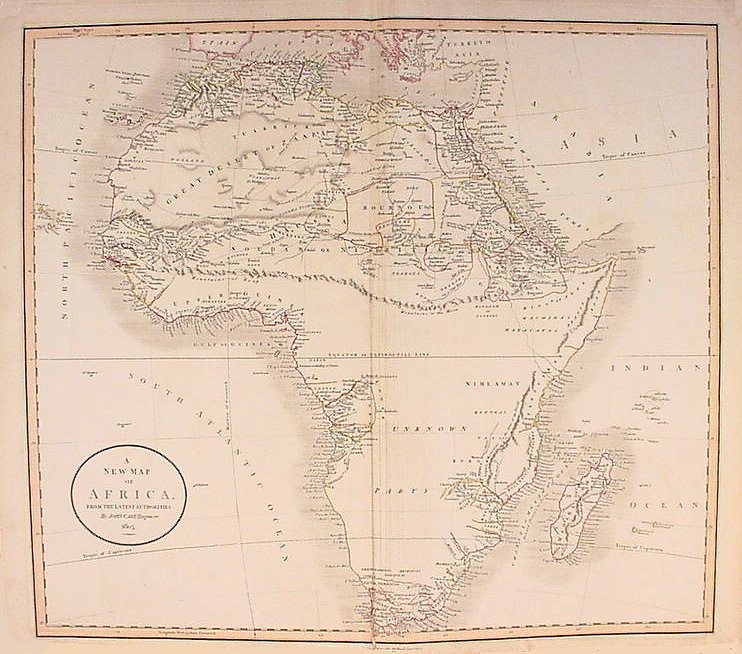
In
the mid 1500s Africa was an absolute blank space on the world map. Ironically,
the coasts of North Africa were actually part of Europe and had been for thousands
of years. But, beyond that even the coasts surrounding the rest of Africa were
unknown except by legend and by Arab slavers who mined living black gold and carried
it off to the slave markets of Arabia, Persia, and the Gulf states.
The
Portuguese were the first to send their explorers off south along the West African
coast to explore.
What
those first European explorers found was colonial pie. By this I mean that Africa
was, from day one, seen by the European powers as a pie they needed to rush forth
and grab, even if they only got one small piece of the pie. As you may know, the
British, Spanish, and the French were the best pie eaters in world history.
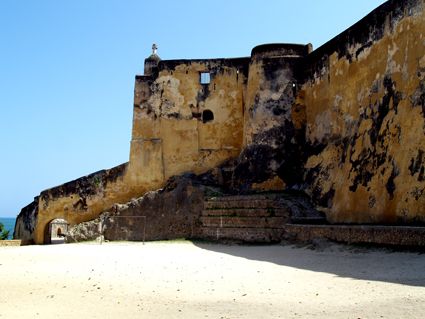
The
method was first to establish trade with the natives on the coast. Once some White
Race presence was located in a coastal city, traders arrived and started plying
the rivers into the interior and making pacts and blood oaths with the native
tribes who seemed to be the most rational.
Next
came the colonial government approved dons, flag in hand, and Catholic Padre nearby
to claim the land for the Holy Mother Church. These European potentates were sent
to set up an office in a port city for the purpose of representing the king or
queen of the European nation to the local chiefs and sheiks.
The
Portuguese never went further into the interior of Africa than the coast, nor
did they care much. They simply planted forts all the way around Africa from West
Africa to Cape Town on the south tip of Africa, on up the east coast at Biera
and Mozambique, and finally at Mombasa where Fort Jesus was built in 1591. [ See
photo above right. ] These forts were the life line of a trade and shipping empire
in the Far East which the Portuguese dreamed of, and the end of the line was Goa
in what is now India. They also took Sri Lanka (Ceylon) in about 1520.
The
British got into the colonial expansion business by taking all the Portuguese
forts on the way to India. This might be called an old world "leveraged buy
out," but without having to pay anything for it. The legend of the British
going forth to claim the world for Britannia is largely myth. The British let
Spain and Portugal make the first capital investment, and then the King or Queen
of England sent forth the British Navy to evict the first tenant and take over
the condominium. Sir Francis Drake of England made himself famous in the empire
business by foreclosing on the Spanish.
The
Portuguese simply lost the enterprise because they were too small a nation to
finance it and man the forts and ships to defend it. This shift to England, as
the main colonial force in the pie eating contest in Africa, resulted mainly from
England's defeat of Spain in the battle of the Spanish Armada in 1575. England
became the premier marine power in the world, and they loved it. They were on
a roll, and Sir Francis Drake (El Diablo) was commissioned by Queen Elizabeth
of England to go pirating against Spain in the Caribbean.
And
now, TA DA, let them eat pie-- African pie.
This
new role of England resulted in military officials being sent to grab all the
Portuguese forts and in building more forts along the way. Unlike the Portuguese,
the British were extremely fascinated with the interior of Africa which was a
virtual "terra nullius," the Roman legal term for "land belonging to no one."
Of course, it belonged to the Africans who lived there, but the Wogs' role in
the Calvinist destiny of Europe was to pretend they never owned Africa until they
were "discovered."
In the scheme
of Anglo Saxon and Roman Mediterranean logic, nothing was "discovered"
and "owned" by anyone until.....
-the White Race arrived,
-the
White race planted their flag,
-the White race anointed it with holy water
for the Pope or the King of England,
-the White race gave it a name (often
based on the explorer's or his sovereign's name),
and finally,
-the White
race levied a "hut tax" on all the "primitive" residents.
By paying
the hut tax, or head tax, which was trivial in value, the residents gave legal
recognition of the Anglo Saxon (or earlier, Spanish) race as their new masters.
Not being British lawyers, the Africans thought they were simply placating the
latest chief who would be in power until they whipped him in battle and ate him
for supper. These childlike Africans innocently handed the pie to Great Britain,
and later to France.
The
same process was used with the American Indians. Undiscovered people in the USA
are called Native Americans, that is, natives who long ago were renamed by an
Italian map maker named Amerigo Vespucci. He called them Indians, revealing how
utterly defective the White Race was at ethnology. Smoking the peace pipe seemed
innocent enough. Becoming a blood brother of a pale faced red haired trouble maker
seemed like a reasonable thing to do. Little did the American Indians know that
the White Race owned their soul and would break every treaty made with the Indians.
I am part Cherokee, and that is why I do not smoke around White people.
What
a lovely experience it has been over the centuries for people minding their own
business around the world to be "discovered." And, thus,
the British and French "discovered" West Africa. What yummy pie!
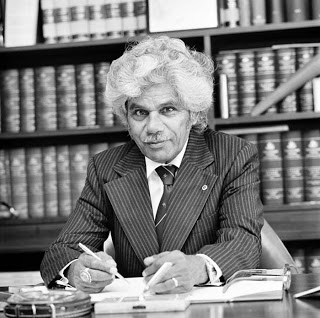 In
Australia the Anglo Saxons, in a fit of collective guilt, have transformed the
Aboriginal people, who were "discovered" long ago by Captain Cooke,
into first class honored citizens and even welcomed them into Parliament. This
must be a great relief to the Aborigines, for Charles Darwin called for the extermination
of the Aboriginal people completely because they were subhuman. Thus, from endangered
species to Member of Parliament-- quite a journey. At least one specie has been
saved from extinction.
In
Australia the Anglo Saxons, in a fit of collective guilt, have transformed the
Aboriginal people, who were "discovered" long ago by Captain Cooke,
into first class honored citizens and even welcomed them into Parliament. This
must be a great relief to the Aborigines, for Charles Darwin called for the extermination
of the Aboriginal people completely because they were subhuman. Thus, from endangered
species to Member of Parliament-- quite a journey. At least one specie has been
saved from extinction.
The
photo at right is of Honorable Neville Bonner, first Aboriginal member of the
Australian Parliament elected in 1972 from Queensland. I wonder if old Chuck Darwin
would lower himself to have a cup of tea with this alleged beast of the outback?
Back to
our plot and the frenzied acquisition of African pie.
The
British eviction of the Portuguese from the east coast of Africa resulted in the
great India type colonial bureaucratic British monster being duplicated around
the coast of Africa. These officials ruling on behalf of His or Her Majesty soon
learned about the vast resources in the interior of Africa. Portugal was allowed
to keep Angola as a consolation prize.
This
resulted in each European power defining a particular area of Africa as their
"sphere of influence," and England's wanderlust for "the interior"
became an addiction. More officials were sent, along with colonial soldiers, and
expeditions were commissioned to explore the interior of the "Dark Continent"
to see exactly what sort of pie they were looking at-- apple Betty or four and
twenty black birds? In the process a number of these fearless explorers were asked
to stay for dinner, never realizing until too late that they would BE dinner.
Let
me explain what a "sphere of influence" is in British legal terms. It
simply says, to the other pie eaters of Europe, "This area is ours if we
ever want to play there and if we can survive the native attacks to take it and
build tea shops on dusty streets in the interior." All that was needed for
a "sphere of influence" to become officially part of the British Empire
was for a corrugated metal building the size of a shoe box to be built, and a
colonial office official was installed in the metal box to sweat profusely and
fill out forms and reports all day. He would literally have a desk that was sloped
toward him so that, as he sweat, the sweat would run off the desk top onto the
floor before it totally washed away his entries into the eternal almighty ledger.
The
final step in claiming one's piece of the African pie was to send officials into
the interior to establish forts, start token trade to justify the horrendous expenditure
back home in Parliament, and finally to draw lines on the map and send copies
to other European rulers to notify them which pieces of the pie they no longer
could claim. The race to grab African pie eventually became a frenzy of colonial
lust, and any explorer or thug who was willing to die of malaria or black water
fever was sent forth from the European nations with great fanfare and prepayments
to his future widow. The European powers seldom had any idea what they had actually
grabbed in the interior, but the need to beat the competition to the pie was reason
enough to grab one more piece.
Few
people understand the colonial era. Today, greed for natural resources drive the
USA and world bankers in a morbid process to destabilize various Third World nations
with the objective of keeping those nations in eternal chaos while harvesting
their oil, titanium, uranium and so forth. This is what the USA is doing in Iraq,
Syria, and Afghanistan, and soon they may try it in Iran. The neocolonial drama
in Syria is in progress as I write, with Russia and possibly China in a struggle
with the USA for another kingdom, in the land of chaos and oil.
PARENTHETIC:
I must warn you that this story will be much like any conversation with an expatriate
"wog" like me who grew up in Africa at the end of the colonial era.
We are going to end with stories about traveling by rail and by lake steamer in
central Africa, but there will be many side trips down various rabbit trails along
the way. My old friends from Africa will relish this I trust, but I also hope
to add to the vast body of writing about the old days in Africa for you who are
willing to risk your sanity wandering about with me.
Back
to colonial pie.
The
Portuguese had the pie all to themselves at first. They even had a small tart
sized piece of pie in Goa in India. The great European powers, England, Belgium,
Denmark, The Netherlands, Germany, and France, were all preoccupied in wars with
each other, and what colonial aspirations they had were with North and South America
and a few other small corners of the world. Africa and India were two great pies
waiting to be gobbled up. So, the Portuguese, over many years, ventured step by
step down the west coast of Africa building forts along the way to guard their
new interests. As noted above, the Spanish were put out of the colonial business
after the Spanish Armada was defeated and Philip II of Spain trashed the treasury
and wore out Spain at the instigation of the Pope.
England
clearly did the best job of grabbing African pie. They first took large areas
in West Africa, and then they went forth to grab South Africa and the Cape. Angola
was left to the Portuguese who had very little pie to themselves. There were actually
occasional fits of "fair play" as certain European pie eaters agreed
to share the pie with one another. Congo was a steaming swamp, and the British
bypassed it, and it later fell into the hands of King Leopold of Belgium as personal
property, a unique innovation in all of colonial history. The British were of
course headed for India, but they wanted outposts up the coast of Africa for supplying
ships going and coming from India and the Far East.
The
Indian experiment was handed to the East Indian Company for management, and as
is the case with all capitalists, the EIC was brutal on the natives. They also
hated the Gospel being sent to India by missionaries because it turned the Indians
from the most crooked rascals on earth into model Christians. This East India
Company policy caused a furor back in England because the sending of the Gospel
to "poor meunited Hindus" was one of the tearful stories used in Parliament
to justify the horrendous budget for colonial pie grabbing. So, the British/Indian
government fired the East India Company and took charge. Tin buildings and red
tape proliferated in abundance, and things improved greatly, the Indian masses
fell in love with their distant mother, Queen Victoria, and the Gospel flowed
to India while the tea and curry powder flowed back to the UK.
The
British were benign rulers most of the time and much more restrained than other
European nations with their subjects. They usually left the structure of local
government in place and simply added their hierarchy to it on top. This almost
always worked well. But, as the British Empire grew larger England had the same
problem Portugal had earlier-- not enough men to rule these vast lands. So, they
simply gave huge areas to one man, usually a District Commissioner, and he used
the existing local government and added his own hired officers who were trained
to administer and conduct business in the classic red tape infested British way.
The Indians loved it and it took many years for them to long for something more.
The only difference between British red tape and Indian red tape is that the Indian
red tape smells of curry.
The
bizarre thing was that some young Englishman, eager to help build the Empire,
would go to university, usually a lower lever colonial minded school other than
Oxford and Cambridge, and coming out with a more down to earth outlook, he was
sent off by the Colonial Office to India. At the age of 27 he might end up being
the only British ruler over an area of India the size of England. The fellow soon
was transformed into a mighty ruler who was conditioned by his fellow higher officials
to be very dignified, be merciful while condescending, live in some degree of
pomp to impress the Indians, and generally make himself the benevolent father
of his children, the Indians.
England's
mistakes in India were mostly in their conduct of military events in which they
subdued areas of India that rebelled. The British were rather brutal at times
and did culturally dumb things too often. So, when they looked into the interior
of Africa from Mombasa on the east coast they decided to use kinder and gentler
tactics and use local rulers, and even local fighting men, for their military
as much as possible. Missionaries were encouraged by the official system to take
the Gospel to the African tribes in order to civilize them. Though the official
motives were mongrel in nature, must of the missionaries did preach a simple authentic
Gospel, and a real African church came into existence. The tribute to the early
missionaries is that the African church thrives in biblical Christianity far better
today than the hip hop American church and the European church which is a lot
of fluffy rubbish.
The
map shows the African colonial pie divided up after the rush ended. Most of the
European powers were content with the spoils of their efforts, and they all got
down to the business of trying to justify the cost, in cash and lives, to acquire
it.
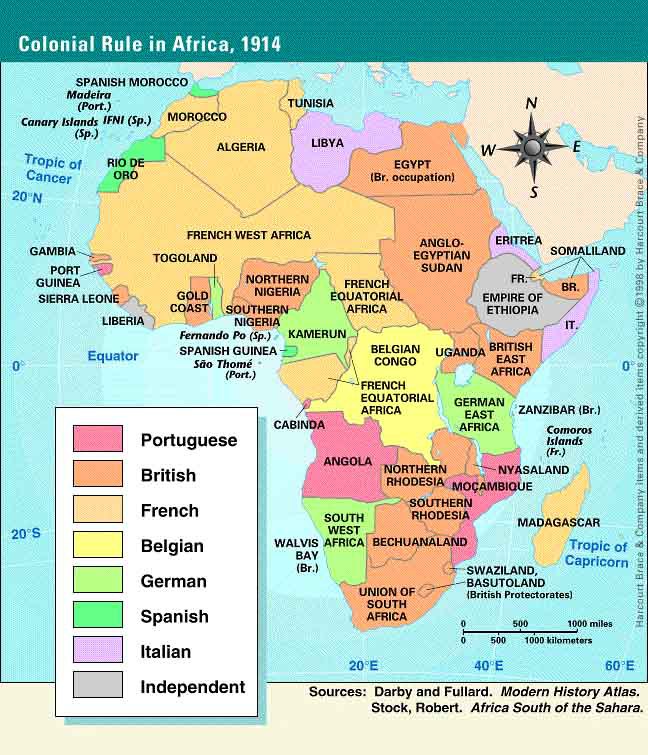
Meanwhile,
Germany was on the move also. They showed up in what is now south Tanganyika (Tanzania
today) on the coast. They then
took Dar-Es-Salaam virtually across narrow straits from the island of Zanzibar
which the British had locked into their "sphere of influence" by taking
charge of the Arab Sultan of Zanzibar and civilizing him. This was a very touchy
moment, and England and Germany were close to firing shots over the German intrusion.
Germany then began developing trade with the interior of Tanganyika. By the 1800s
Germany was into a program to build rail service from the coast to Lake Tanganyika
where David Livingston had based his work of exploration while abandoning his
wife in England.
England
saw the German strategy, and England panicked. Many breathless speeches of terror
and suspense were made in Parliament by MPs who knew about as much about Africa
as they knew about the South Pole. The Hun was on the move again.
Intelligence
in England reported that Germany intended to go around the west side of Lake Victoria
and take Uganda. Meanwhile, England totally controlled the ruler in Egypt, Mohammed
Ali, and together they ruled up the Nile River to south Sudan by financing Mohammed
Ali's extravagant glory. Beyond that, no single European nation had a presence
in the 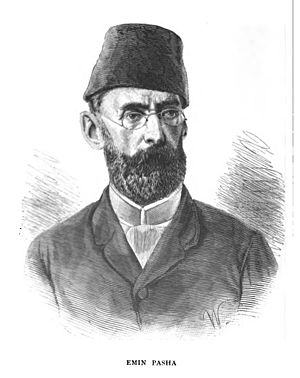 lake
areas of central Africa other than a German doctor, Eduard Schnitzer. He was commissioned
by the Egyptian ruler, Mohammed Ali, in about 1875 to govern Equatoria between
Sudan and Lake Victoria as a private venture not exactly under British authority.
He was a kind hearted man who loved the people and even joined them in battle
to defend their territory.
lake
areas of central Africa other than a German doctor, Eduard Schnitzer. He was commissioned
by the Egyptian ruler, Mohammed Ali, in about 1875 to govern Equatoria between
Sudan and Lake Victoria as a private venture not exactly under British authority.
He was a kind hearted man who loved the people and even joined them in battle
to defend their territory.
He
was also called Emin Pasha by the local Muslims, and he made a token conversion
to Islam. Both Germany and England felt they could take charge of Emin Pasha because
he was German, after all, but he was also working for the Egyptian government
which was being ruled by British influence.
So,
the British colonial office began to panic. If Germany put a rail line through
all the way to Uganda, they could then surround the British territory, now Kenya,
that is, if they could convince Emin Pasha to throw in with their German enterprise.
The Germans even sent a delegation in from Somalia to make contact with Emin Pasha
and recruit him for the Fatherland. It never reached him, but the gesture frightened
the British. Thus, the idea was hatched-- build a railroad from Mombasa to Kampala,
Uganda. The colonial office pushed the idea based on two things, stop the Germans
from taking central Africa, and convert the Baganda tribe and the King of Uganda
to Christianity once and for all with the help of the Church Missionary Society
missionaries.
The
king of Uganda, Mutesa, was surrounded by Catholic priests, Church if England
missionaries, and Muslim traders. It was thought that King Mutesa would convert
on the spot to whomever bid the highest in guns and ammunition. He was also fond
of navigational instruments made of glass and brass. With the grand appearance
of a solid British presence, in the form of a large corrugated building with white
washed rocks along the pathway, King Mutesa might become a Christian and not backslide
again to Rome or Mecca. Mutesa had a terrible time making up his mind, and as
British missionaries reasoned with him, he would be fondling the private parts
of young naked pages standing around his throne. The Church of England was asking
for a really serious work of Christian grace to convert Mutesa once and for all.
The British convinced King Mutesa eventually that with the guns he must accept
schools. The end of the story is that the Christian Church in Uganda is possibly
the strongest in the world as to its effect on life in Uganda. Uganda is one of
the only nations in the world with laws against sodomy. Quite a reverse actually.
The
possibility of Uganda becoming a Christian island of British theology was preached
loudly in Parliament. Also, the colonial office produced alleged evidence to skeptical
MPs that Uganda was a virtual paradise and had great potential as a food producing
source for the Empire. That turned out to be true later, but up front it was based
on nothing but invention.
Parliament
balked and balked, but the Colonial Office prevailed in its panic party, painting
visions of Germany eating all the pie, and finally they managed to stampede Parliament
into approving the cost of the building of a railroad from Mombasa to Uganda.
The whole thing got off to a rather flamboyant start with plenty of careful planning
to cross a semi-desert region near the Kenya coast, and then on through to the
Kenya Highlands. The Masai tribe would be certain to disrupt the work, so some
local diplomacy was arranged, partly using Maxim guns which misfired terribly,
but the revolving multi-barreled machine gun terrified people. Also, copper wire
was used to both pretty up the Masaii ladies, and to convince the Masaii warriors
to simply ask for the wire instead of cutting down the telegraph wires for the
railway.
Thousands
of Indians from India were recruited to go to Kenya and work on the rail right
of way. Experienced British engineers from India were assigned to the work. Much
pain and sorrow came to these men, especially when man eating lions near Tsavo
started killing and eating workers about every other night for weeks. You should
find a copy of Man Eaters of Tsavo. There is no other story quite like
it for suspense and melodrama.
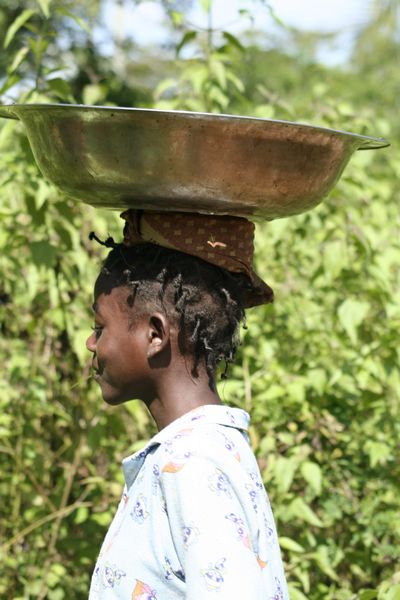 A
railhead work camp was set up at Nairobi, "the place of water" in the
Masai language. It was either fiercely dusty or muddy, depending on the time of
year, but it thrived and became a city of corrugated metal boxes over night. The
right of way was then extended up the escarpment of the Rift Valley and was a
nightmare of engineering. Tunnels were ruled out because the British Government
was concerned that they could be bombed in the event of war. So, extremely deep
cuts were dug through high ridges and the dirt poured into the ravines just following
as huge fills. All of this was done with "karai" pans about 2.5 feet
across and then carried on the heads of the African and Indian workers. Everything
was done by hand work. The grade is one of the steepest in the world, and engines
had to be made that could develop exceptional traction. The Garrett articulated
was the choice. More on this later.
A
railhead work camp was set up at Nairobi, "the place of water" in the
Masai language. It was either fiercely dusty or muddy, depending on the time of
year, but it thrived and became a city of corrugated metal boxes over night. The
right of way was then extended up the escarpment of the Rift Valley and was a
nightmare of engineering. Tunnels were ruled out because the British Government
was concerned that they could be bombed in the event of war. So, extremely deep
cuts were dug through high ridges and the dirt poured into the ravines just following
as huge fills. All of this was done with "karai" pans about 2.5 feet
across and then carried on the heads of the African and Indian workers. Everything
was done by hand work. The grade is one of the steepest in the world, and engines
had to be made that could develop exceptional traction. The Garrett articulated
was the choice. More on this later.
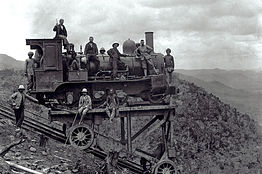 The
girl at the left has a karai on her head. Before the automobile came along the
karai was the utility truck of Africa.
The
girl at the left has a karai on her head. Before the automobile came along the
karai was the utility truck of Africa.
The
first right of way ran along from Nairobi for forty miles until it reached Kijabe
where my wife and I went to school at Rift Valley Academy. The school, of course,
did not exist until much later. Right after this point was reached by the work
crews, a section of the Rift Valley escarpment was so steep that the engineers
could not find a way to descend to the floor of the Rift Valley. So, they ended
the line there, and a winching arrangement was made (see photo) whereby the train
was disassembled and the cars (bogies) were winched down a steep slope to a lower
level and the train reassembled and an engine connected. By our time in school
there they had rerouted the line without interruptions.
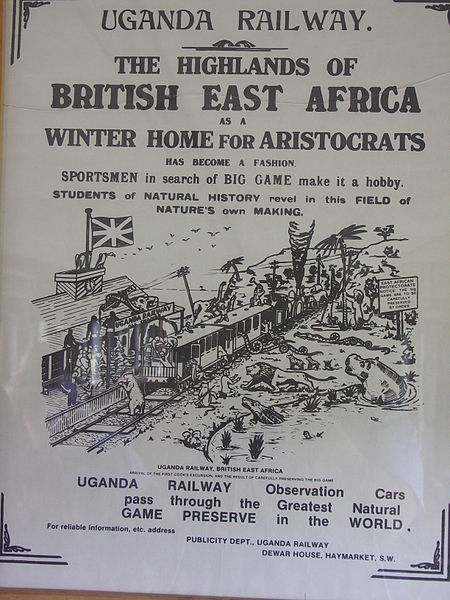 Right
after the Uganda Railway was finished the opposition in the British Parliament
started mocking at it because it served no use. There had been a conference in
which the royal cousins, Queen Victoria and the Kaiser of Germany, drew lines
on a map of East Africa and formally divided the pie and called off the contest
for more pie. The Germans backed off and totally abandoned their aspirations to
conquer central Africa. So, the Uganda Railway was nicknamed "The Lunatic
Express." The dream of using Eduard Schnitzer to grab Equtoria and the headwaters
of the Nile ended when he fell off of a balcony (cough) on the way back to England
against his will.
Right
after the Uganda Railway was finished the opposition in the British Parliament
started mocking at it because it served no use. There had been a conference in
which the royal cousins, Queen Victoria and the Kaiser of Germany, drew lines
on a map of East Africa and formally divided the pie and called off the contest
for more pie. The Germans backed off and totally abandoned their aspirations to
conquer central Africa. So, the Uganda Railway was nicknamed "The Lunatic
Express." The dream of using Eduard Schnitzer to grab Equtoria and the headwaters
of the Nile ended when he fell off of a balcony (cough) on the way back to England
against his will.
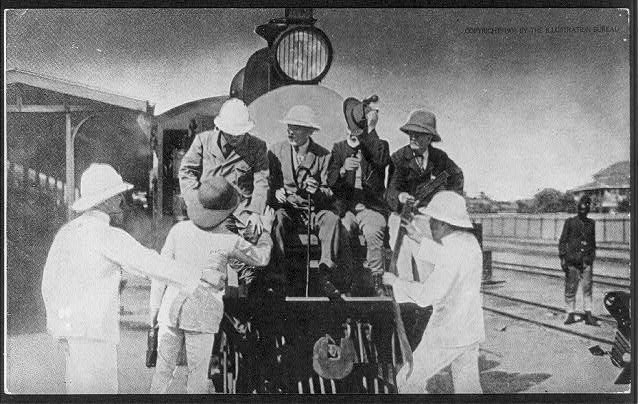 The
Colonial Office was encouraged by the Prime Minister to try to come up with some
legitimate use of the railway other than hauling local corn crops to market. They
came up with the idea that British folks might be enticed to visit East Africa
if they thought of the rail line as a tourist destination. Thus, the poster you
see at the right. This was not a joke. They were desperate to see tourists come
and ride. They did eventually, but many years later. The poster, as absurd as
it is now, was very serious in trying to sell Englishmen on the idea of visiting
East Africa and even settling there.
The
Colonial Office was encouraged by the Prime Minister to try to come up with some
legitimate use of the railway other than hauling local corn crops to market. They
came up with the idea that British folks might be enticed to visit East Africa
if they thought of the rail line as a tourist destination. Thus, the poster you
see at the right. This was not a joke. They were desperate to see tourists come
and ride. They did eventually, but many years later. The poster, as absurd as
it is now, was very serious in trying to sell Englishmen on the idea of visiting
East Africa and even settling there.
The
above photo is of President Theodore Roosevelt riding on the engine so he could
stop the train and shoot game with the Governor of Kenya at the beginning of his
visit to Kenya in 1909.
The
British press also spent a lot of time lampooning the British colonial officers.
The assumption was that they were the same pompous sort who had reigned supreme
in the model of the British Raj for many years in India, and there was some truth
to the accusation. The illustration at the left was from Vanity Fair and
is of a colonial official.

